기독간호대학교 | |
| Location | , South Korea 35°08′19″N126°54′58″E / 35.13849°N 126.91602°E |
|---|---|
| Website | www |
| | This article about a South Korean institution of tertiary education is a stub. You can help Wikipedia by expanding it. |
기독간호대학교 | |
| Location | , South Korea 35°08′19″N126°54′58″E / 35.13849°N 126.91602°E |
|---|---|
| Website | www |
| | This article about a South Korean institution of tertiary education is a stub. You can help Wikipedia by expanding it. |
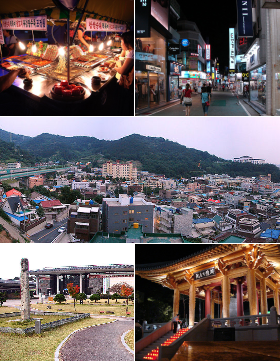
Gwangju, formerly romanized as Kwangju, is South Korea's sixth-largest metropolis. It is a designated metropolitan city under the direct control of the central government's Home Minister. The city was also the capital of South Jeolla Province until the provincial office moved to the southern village of Namak in Muan County in 2005 because Gwangju was promoted to a metropolitan city and was independent of South Jeolla province.
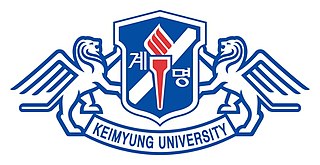
Keimyung University, abbreviated as KMU or Keimyung (Korean: 啓明), is a private university located in Daegu, the fourth largest city in South Korea. The university was founded in 1954 with the support of the leaders of the Northern Presbyterian Church of the U.S. as a Christian university. KMU is composed of three campuses in the city of Daegu, South Korea. They are named for their locations within the city; Daemyeong, which is near the downtown area, Seongseo, which is in the western part of the city, and also Dongsan campus which includes Dongsan Medical Center.

The Gwangju Uprising, known in Korean as May 18, were student-led demonstrations that took place in Gwangju, South Korea, in May 1980. The uprising was in response to the coup d'état of May Seventeenth that installed Chun Doo-hwan as military dictator and the implementation of martial law. Following his ascent to power, Chun arrested opposition leaders, closed all universities, banned political activities, and suppressed the press. The uprising was violently suppressed by the South Korean military with the approval and logistical support of the United States under Carter administration, which feared the uprising might spread to other cities and tempt North Korea to interfere. The uprising is also known as the May 18 Gwangju Democratization Movement, the Gwangju Democratization Struggle, the May 18 Democratic Uprising or the Gwangju Uprising in South Korea.
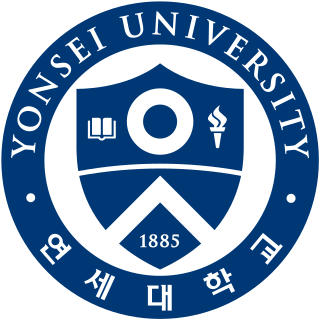
Yonsei University is a private Christian university in Seoul, South Korea. It is part of the SKY universities.

Chonnam National University is one of ten Flagship Korean National Universities located in Gwangju and South Jeolla Province, South Korea. In March 2006, Yeosu National University merged with Chonnam National University to become a satellite campus. CNU ranked the 10th nationwide and the 420th worldwide in world university rankings in the CWUR. It was also the 1st among the nine Korean national flagship universities in "Asia’s Top 75 Most Innovative Universities" in 2017 Reuters. CNU has also expanded its global reach by establishing partnerships with 499 Universities in 62 countries as of 2019.
Dongkang College (Korean: 동강대학교) is a private technical college in Buk District, Gwangju, South Korea. The current president is Kim Kyong Taek (김경택). About 110 instructors are employed.

Korea National Open University is a national university of South Korea. The school provides higher education including undergraduate, graduate and non-degree programs as well as distance-learning courses in Korean for more than 180,000 students. It was established in 1972 as a branch faculty of Seoul National University, with 2-year junior college courses. In 1982, KNOU was separated from SNU and established as a national university, launching programs for 4-year undergraduate degrees. As of 2009, the university has 46 offices and regional learning centres nationwide, and domestic cable television channel (OUN) for broadcasting lectures. It provides accredited bachelor's and master's degree for various fields, as well as non-degree qualifications such as diplomas and certificates, or life-long learning units. The school's main campus is located in Daehak-ro, Jongro-gu, Seoul.

The Gwangju Institute of Science and Technology (GIST) is a research-oriented university focused on science and technology that is located in Gwangju, South Korea. GIST is a member of the research-oriented universities group consisting of GIST-KAIST-UNIST-UST-POSTECH-DGIST.
Gwangju University (Korean: 광주대학교) is a university in Gwangju, South Korea.
Kwangju Foreign School is an international school in the city of Gwangju, South Korea. It was opened in response to city officials needing an international school to attract foreign business.
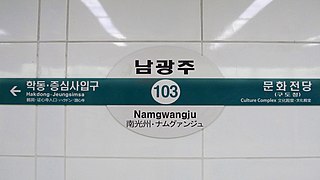
Namgwangju station is a station on Gwangju Metro Line 1, located at Hak-dong 994 in Dong-gu, Gwangju, South Korea. It opened for service on April 28, 2004.

The 2015 Summer Universiade was a Universiade held in the city of Gwangju, South Korea. It took place from July 3 to July 14, 2015. Gwangju also hostes the group matches of the 2002 FIFA World Cup.
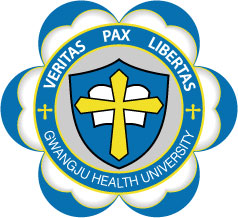
Gwangju Health University (GHU) is a private bachelor's degree-granting community college located in Gwangju Metropolitan City, South Korea. Established in 1972, GHU, has received national accreditation by the Ministry of Education as a World Class College in 2013, rated "Level A" for Structure Reformation Evaluation in 2016, and rated "Level S" for Specialized Education since 2015. There are over 4,000 students attending one of fourteen academic programs on campus. The academic programs at GHU focus on humanities and social sciences and the natural sciences. Various 2-year associate degree programs, 3-year associate degree programs, 4-year bachelor's degree program, and intensive study programs for a bachelor's degree (전공심화과정) are offered at GHU.

Oikos University is a private Korean Christian university in Oakland, California. The university is accredited by the Transnational Association of Christian Colleges and Schools (TRACS).
Gwangju Inhwa School (Korean: 광주인화학교) was a school for hearing-impaired students founded in 1961 and located in Gwangju, South Korea. The school made national headlines after its decades-long record of sexually abusing students was uncovered in 2005. Following a series of investigations and amid public outcry, the school was closed in November 2011. The school was also accused of child murder.
Student Human Rights Ordinance (Korean: 학생인권조례) is an ordinance in operation in some cities and provinces in South Korea. It first began in Gyeonggi-do Province (2010) and expanded to Gwangju (2011), Seoul (2012), the North Jeolla Province (2013), the South Chungcheong Province, and Jeju Province (2021). In 2019, South Gyeongsang Province proposed a bill as well, but it was finally rejected after being met by strong opposition from Christian groups. The primary objective of the ordinance is to extend human rights protection for students and youth in South Korea.
Gwangju Jeil High School is a boys' high school in Gwangju, South Korea. It has 840 students in grades 10, 11, and 12. The school is considered to be one of the most prestigious high schools in Gwangu.